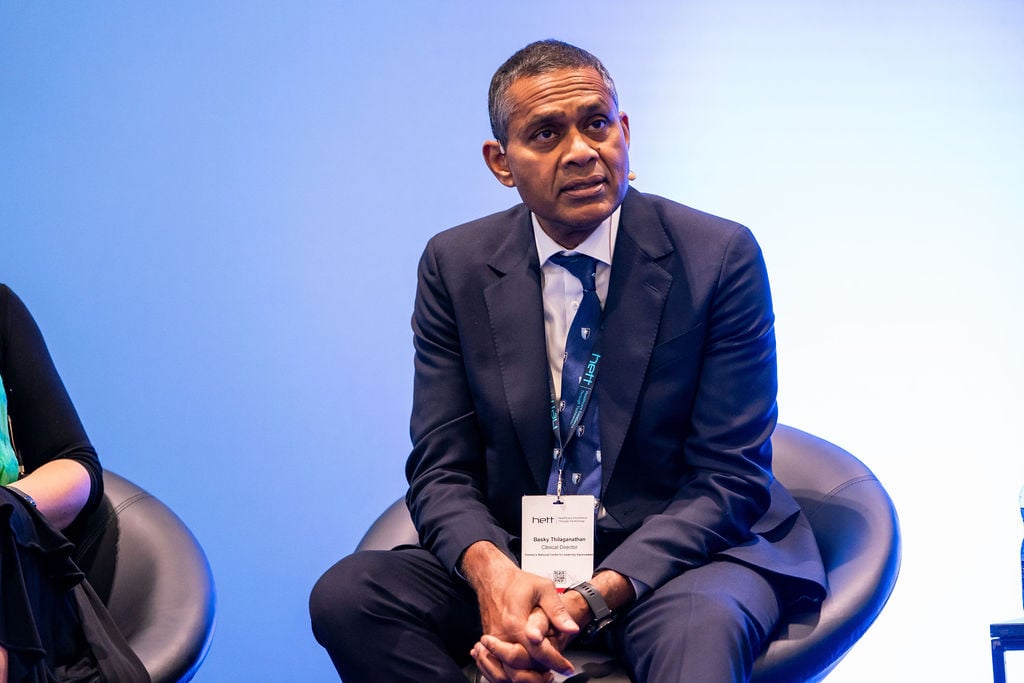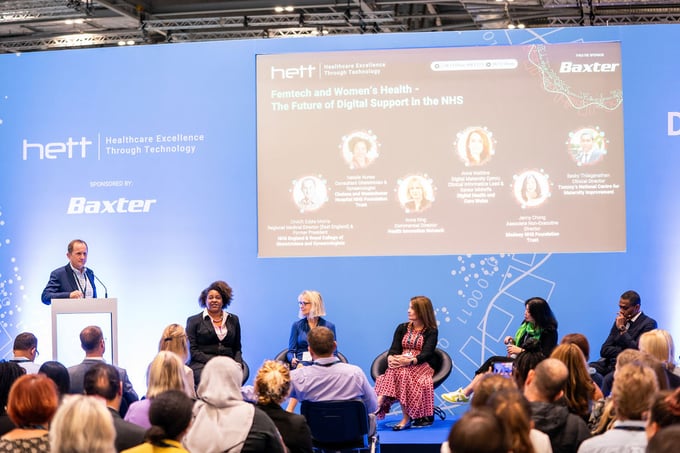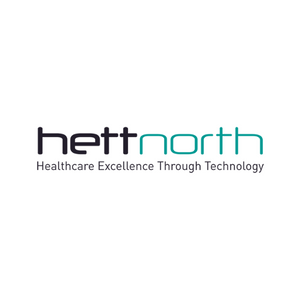‘Femtech and Women’s Health - The Future of Digital Support in the NHS’ was one of the most-attended sessions at this year’s HETT Show. The session explored the current FemTech landscape and how this is evolving to encourage more innovative solutions with a focus on women’s health. The discussion was chaired by Eddie Morris, Regional Medical Director (East England) & Former President, NHS England & Royal College of Obstetricians and Gynaecologists. Eddie was joined by a panel featuring:
- Natalie Nunes, Consultant Obstetrician & Gynaecologist, Chelsea and Westminster Hospital NHS Foundation Trust
- Anna King, Commercial Director, Health Innovation Network
- Anne Watkins, Digital Maternity Cymru Clinical Informatics Lead & Senior Midwife, Digital Health and Care Wales
- Jenny Chong, Associate Non-Executive Director, Medway NHS Foundation Trust
- Basky Thilaganathan, Clinical Director, Tommy’s National Centre for Maternity Improvement
Key Takeaways: Exploring FemTech Healthcare in More Detail
The session covered several areas of discussions across the evolving landscape of FemTech healthcare:
Maternity Care and Digital Technology
The panel highlighted that when discussing digital technology and its current role in maternity care, we are primarily referring to maternity information systems designed to collect and organise data for later accessibility. However, these systems fall short in providing crucial support for clinicians, fail to adequately assess pregnancy risks, and lack context-specific decision support. Instead, they mainly offer a repository of recommendations without addressing what actions to take at certain points in time.
The digital revolution that is happening right now has been characterised by a standardised approach that applies the same procedures to everyone and does not enable personalised care. It assumes a one-size-fits-all model, disregarding the fact that not all women share the same characteristics during pregnancy. For instance, ethnic minority women face a three to five times higher risk of adverse pregnancy outcomes. This bias stems from limitations of machine learning, whereby feeding it with biased and historical data, leads to inherently biased predictions. One effective strategy to mitigate this bias is to introduce data diversity throughout the entire data processing pipeline.
Overcoming the current challenges with maternity care and digital technology
One of the major challenges in applying machine learning to maternity care is the fragmented state of information systems. In England, there are 130 maternity units, each using different information systems stored on 130 separate servers. As a result, data collection is not standardised and does not link to data quality outcomes. While there is a wealth of data, it is challenging to understand outcomes in a high level of detail.
The Tommy's software medical device, a CE-marked MHaR device, enables a numerical risk assessment that guides care pathways. This information is shared with the women, providing them with a clear understanding of their care pathway. The Tommy's app operates in the background to gather data, helping in current care and potentially utilising machine learning to detect data patterns for the future.
Data collected by the Tommy's app is stored in the NHS's Cloud Centre of Excellence, ensuring universal data access for NHS England. This data is linked to the baby's NHS number and includes three safety measures to ensure we have the outcomes in two years time to have 150,000 pregnancies a year going through the device with clinically relevant outcomes.

The roll out of Tommy’s App - Including the patient
Basky Thilaganathan discussed how the development of Tommy’s app harnessed the power of the Women's Voices Network, comprising 700 women affiliated with the Royal College of Obstetricians and Gynecologists. These women played a pivotal role in providing valuable insights and input, effectively integrating their perspectives into every stage of development.
This inclusive approach brought about a fundamental shift in the project's direction. Instead of solely focusing on the needs of doctors and obstetricians, the emphasis shifted toward creating a medical device principally intended for women, which would also be beneficial for clinicians and midwives.
Remarkably, when the device was introduced into the first four hospitals, only 9 out of 23,000 registered women were unable to use it, highlighting minimal digital exclusion. This outcome underscored the success of the approach in ensuring accessibility and inclusivity.
By incorporating the voices and needs of women throughout the development process, the resulting device resonated with the user community. It not only became a tool that women wanted to use but also one that proved highly beneficial for clinicians and midwives, serving as a testament to the positive impact of patient inclusion in healthcare innovation.
How is innovation in FemTech being supported?
Anna King highlighted the Health Innovation Network's support for innovators, including accelerator programs aimed at testing and deploying products in the NHS. They're currently running a women's health accelerator program for early-stage companies with Innovate UK's backing, focused on developing innovative solutions through feasibility studies and scalable deployment.
One notable aspect of this innovation landscape is the emergence of numerous women's health tools that can provide valuable support for mothers. These tools encompass a diverse range of offerings, from products utilising augmented reality to aid with breastfeeding to solutions addressing language barriers, among others.
The Health Innovation Network plays a pivotal role in connecting innovators with the healthcare system by understanding both health system and patient needs. This process involves identifying healthcare needs, evaluating existing innovations, implementing accelerator programs to foster innovation development, and creating feedback loops to assess their effectiveness and support their adoption.

Research and clinical trials: The impact on women’s health
Jenny Chong went on to discuss how that in the domain of research and clinical trials, a significant issue is the underrepresentation of women. Historically, clinical research has largely excluded women from its studies. It wasn't until 2016 that the National Institutes of Health (NIH) mandated the inclusion of female animals in preclinical trials. This long-standing omission was primarily driven by concerns related to the complexity of female hormonal cycles, which introduced additional variables, inconveniences, and increased costs to clinical trials. Unfortunately, this exclusion had real-world consequences, leading to a higher occurrence of adverse reactions in women when drugs were eventually introduced to the market.
Between 1997 and 2000, a troubling statistic emerged: a staggering 80% of drugs withdrawn from the market were due to adverse reactions, with women being the primary reporters of these reactions. Considering the immense cost of bringing a drug to market, which can approach nearly 2.3 billion dollars, this gender disparity in adverse reactions poses a substantial and expensive problem.
To address this issue, it is imperative to diversify research efforts. Similar to the principles applied in machine learning, research must embrace diversity to ensure the robustness and reliability of its findings. Inclusion of a more representative sample of the population, including women, is essential to develop medical products that are both safe and effective for all individuals.
Join the conversation – register for HETT North 2024
Be part of the next discussion around FemTech healthcare by registering for HETT North 2024 taking place at Manchester Central Convention Complex, 28th February 2024. Key highlights include:
- 40+ hours of CPD-certified content across 6 streams
- 1-2-1 meeting opportunities with over 1,400 digital health professionals
- 100+ expert speakers
- 100+ innovative suppliers
%20(1).png?width=500&height=58&name=HETT%20insights%20logo%20RGB-04%20(1)%20(1).png)


